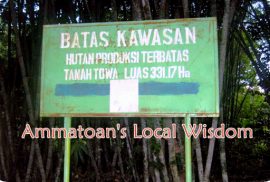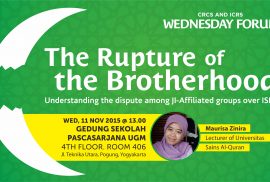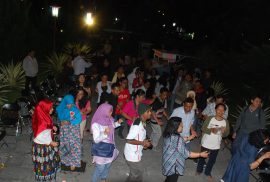 =&0=&
The relation between people’s perceptions of pollution (of Upper Citarum river) and purification (in Islamic teaching and local narratives) and their practices of water use.
Growing population and excessive urbanization in West Java has led to an increased demand for water and space, bringing with it significant problems related to water in and around the Upper Citarum River basin. The environmental burden is making the Citarum one of the most polluted rivers in the world. More effective water management and attention to public health has been perceived as the best way to overcome the problem, but that approach puts aside local views on the sacred nature of the river’s water. Hence it is is necessary to focus on the nexus between development and religion as concerns water. This presentation will search for the answer in how Muslims in the Upper Citarum Basin perceive the river as (un)clean and how their behavior is influenced by their understandings of pollution and purification.
Speaker
Haryani Saptaningtyas is a researcher and member of the advocacy staff of Percik Institute, Salatiga. She completed her master degree in Social and Cultural Anthropology, Vrije Universiteit, Amsterdam, The Netherlands. Since 1997, she has been actively involved in social and enviromental research. Currently she is a Ph.D. candidate in the Faculty of Philosophy, Theology and Religious Studies at Radboud University Nijmegen, where she is working on an interdisciplinary research project entitled “Water, Health and Development at Upper Citarum River Basin.”
=&0=&
The relation between people’s perceptions of pollution (of Upper Citarum river) and purification (in Islamic teaching and local narratives) and their practices of water use.
Growing population and excessive urbanization in West Java has led to an increased demand for water and space, bringing with it significant problems related to water in and around the Upper Citarum River basin. The environmental burden is making the Citarum one of the most polluted rivers in the world. More effective water management and attention to public health has been perceived as the best way to overcome the problem, but that approach puts aside local views on the sacred nature of the river’s water. Hence it is is necessary to focus on the nexus between development and religion as concerns water. This presentation will search for the answer in how Muslims in the Upper Citarum Basin perceive the river as (un)clean and how their behavior is influenced by their understandings of pollution and purification.
Speaker
Haryani Saptaningtyas is a researcher and member of the advocacy staff of Percik Institute, Salatiga. She completed her master degree in Social and Cultural Anthropology, Vrije Universiteit, Amsterdam, The Netherlands. Since 1997, she has been actively involved in social and enviromental research. Currently she is a Ph.D. candidate in the Faculty of Philosophy, Theology and Religious Studies at Radboud University Nijmegen, where she is working on an interdisciplinary research project entitled “Water, Health and Development at Upper Citarum River Basin.”
 =&0=&
The relation between people’s perceptions of pollution (of Upper Citarum river) and purification (in Islamic teaching and local narratives) and their practices of water use.
Growing population and excessive urbanization in West Java has led to an increased demand for water and space, bringing with it significant problems related to water in and around the Upper Citarum River basin. The environmental burden is making the Citarum one of the most polluted rivers in the world. More effective water management and attention to public health has been perceived as the best way to overcome the problem, but that approach puts aside local views on the sacred nature of the river’s water. Hence it is is necessary to focus on the nexus between development and religion as concerns water. This presentation will search for the answer in how Muslims in the Upper Citarum Basin perceive the river as (un)clean and how their behavior is influenced by their understandings of pollution and purification.
Speaker
Haryani Saptaningtyas is a researcher and member of the advocacy staff of Percik Institute, Salatiga. She completed her master degree in Social and Cultural Anthropology, Vrije Universiteit, Amsterdam, The Netherlands. Since 1997, she has been actively involved in social and enviromental research. Currently she is a Ph.D. candidate in the Faculty of Philosophy, Theology and Religious Studies at Radboud University Nijmegen, where she is working on an interdisciplinary research project entitled “Water, Health and Development at Upper Citarum River Basin.”
=&0=&
The relation between people’s perceptions of pollution (of Upper Citarum river) and purification (in Islamic teaching and local narratives) and their practices of water use.
Growing population and excessive urbanization in West Java has led to an increased demand for water and space, bringing with it significant problems related to water in and around the Upper Citarum River basin. The environmental burden is making the Citarum one of the most polluted rivers in the world. More effective water management and attention to public health has been perceived as the best way to overcome the problem, but that approach puts aside local views on the sacred nature of the river’s water. Hence it is is necessary to focus on the nexus between development and religion as concerns water. This presentation will search for the answer in how Muslims in the Upper Citarum Basin perceive the river as (un)clean and how their behavior is influenced by their understandings of pollution and purification.
Speaker
Haryani Saptaningtyas is a researcher and member of the advocacy staff of Percik Institute, Salatiga. She completed her master degree in Social and Cultural Anthropology, Vrije Universiteit, Amsterdam, The Netherlands. Since 1997, she has been actively involved in social and enviromental research. Currently she is a Ph.D. candidate in the Faculty of Philosophy, Theology and Religious Studies at Radboud University Nijmegen, where she is working on an interdisciplinary research project entitled “Water, Health and Development at Upper Citarum River Basin.”


 Many of us know Ammatoans from general perspectives about them. Their traditional ways of life are fascinating. Indeed, if we watch TV programs about ethnicity or similar topic, Ammatoans are usually portrayed as a small community group who “still” believe in “animism” and hold rituals for forest conservation. In some religious programs on Indonesian television, Ammatoans are shown as Muslim who practice “syncretism” because they give offerings to the forest, mountains and lands. Indonesians have a lot of stereotypes about Ammatoans, but who they really are without judgmen? Concerning with these stereotypes of Ammatoans, On Wednesday 16th September, Wednesday Forum of CRCS/ICRS presented Dr Samsul Maarif who had concerned his deep research in Ammatoans and said in otherwise fact.
Many of us know Ammatoans from general perspectives about them. Their traditional ways of life are fascinating. Indeed, if we watch TV programs about ethnicity or similar topic, Ammatoans are usually portrayed as a small community group who “still” believe in “animism” and hold rituals for forest conservation. In some religious programs on Indonesian television, Ammatoans are shown as Muslim who practice “syncretism” because they give offerings to the forest, mountains and lands. Indonesians have a lot of stereotypes about Ammatoans, but who they really are without judgmen? Concerning with these stereotypes of Ammatoans, On Wednesday 16th September, Wednesday Forum of CRCS/ICRS presented Dr Samsul Maarif who had concerned his deep research in Ammatoans and said in otherwise fact.




